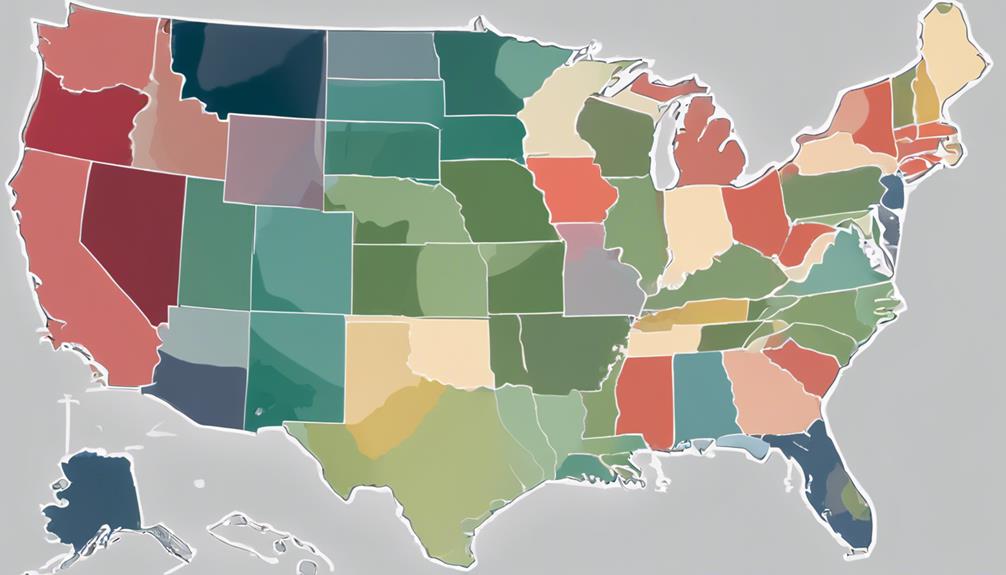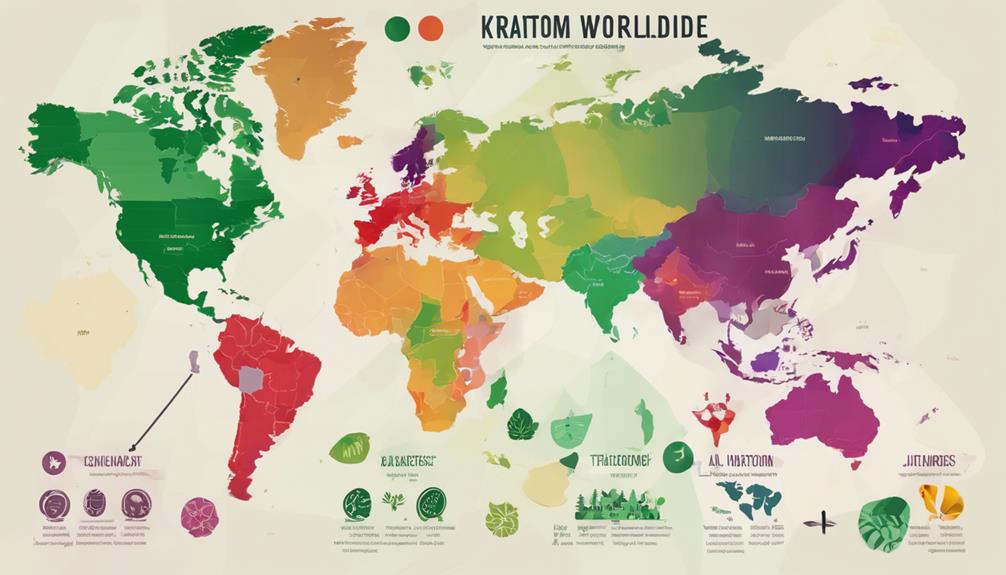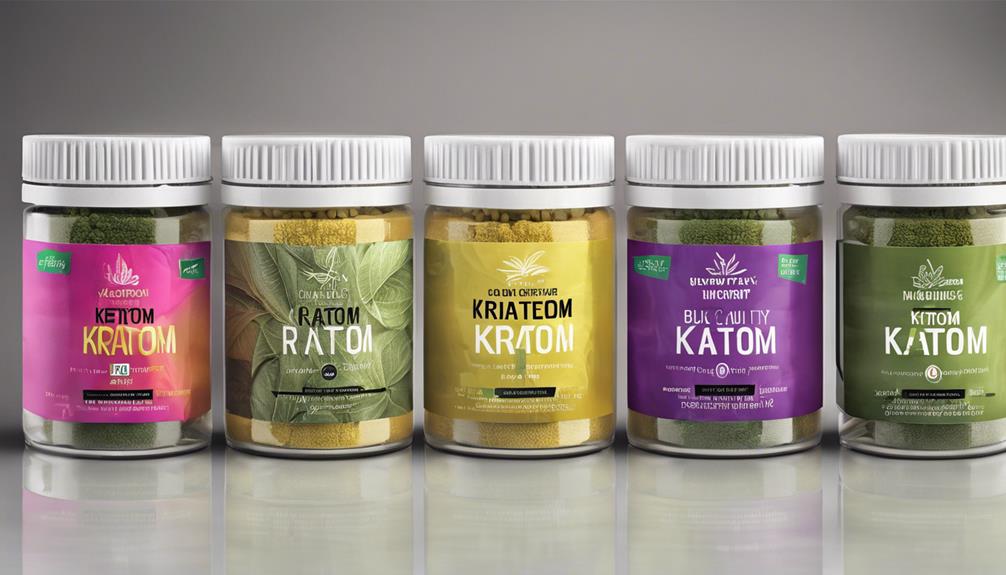Deprecated: mb_convert_encoding(): Handling HTML entities via mbstring is deprecated; use htmlspecialchars, htmlentities, or mb_encode_numericentity/mb_decode_numericentity instead in /home/users/kratomfiles/www/kratomfiles.com/wp-content/plugins/quick-adsense-reloaded/includes/template-functions.php on line 3552
Exploring the patchwork of kratom legality across the states can present some intricacies for those interested in investigating this subject. As you investigate the complexities of kratom regulations, you may find yourself curious about the contrasting approaches different states have taken towards this natural product. Stay tuned to discover how each state's stance on kratom can impact your access and usage, shedding light on the nuanced landscape of kratom legality in the U.S.
Key Takeaways
- Kratom legality varies by state, with bans in Alabama, Arkansas, and Wisconsin.
- States like Alaska and Colorado have no specific regulations on kratom.
- Arizona enforces the Kratom Consumer Protection Act for consumer safety.
- Delaware allows kratom but lacks specific regulations, emphasizing consumer vigilance.
- Advocacy groups impact public opinion and potential legislation on kratom in states like Delaware.
Kratom Legality Overview

In the domain of state laws across the US, the legality of kratom stands as a complex and evolving landscape. With varying regulations in different states, understanding the legal status of kratom is important for both consumers and retailers to guarantee compliance. Some states have implemented the Kratom Consumer Protection Act (KCPA) to regulate the herb, aiming to provide guidelines for its safe use and distribution.
Advocacy groups like the American Kratom Association play a significant role in advocating for the legal status of kratom. They work towards ensuring that individuals have access to kratom products in a safe and regulated manner. Despite these efforts, states such as Alabama, Arkansas, and Wisconsin have taken a stricter stance by completely banning kratom due to safety concerns and the potential for abuse.
As legislative changes and advocacy groups continue to influence the future of kratom regulation, staying informed about the legal landscape of kratom in different states remains important.
Legal Status in Alabama
In Alabama, kratom is classified as a banned substance since May 2016 under the Controlled Substances Act. The possession, sale, and distribution of kratom are strictly illegal in the state, as it is considered a Schedule I controlled substance. Violating the kratom ban in Alabama can result in severe legal repercussions.
Alabama's Current Laws
Alabama prohibits the possession, distribution, and manufacturing of kratom under the Controlled Substances Act since 2016. The ban on kratom in Alabama is primarily due to concerns regarding potential health risks associated with its use. Those found violating Alabama's kratom ban may face legal consequences, including fines and imprisonment. Unlike some states, Alabama does not currently have a Kratom Consumer Protection Act in place to regulate the sale and use of this herb.
- Legal possession, distribution, and manufacturing of kratom are prohibited.
- Concerns over health risks led to the ban.
- Violators can face fines and imprisonment.
- Absence of a Kratom Consumer Protection Act in Alabama.
Recent Legislative Changes
Have there been any recent legislative changes affecting the legal status of kratom in Alabama? Alabama banned kratom in 2016, categorizing it as an illegal substance for possession, distribution, and sale within the state. The Alabama Department of Public Health designated kratom as a Schedule I controlled substance due to concerns regarding its potential for abuse and addiction. Violating the kratom ban in Alabama can result in severe legal repercussions, including fines and imprisonment. Despite ongoing advocacy efforts to overturn the ban, the prohibition on kratom remains in effect in Alabama. It is essential to stay informed about the current laws and regulations regarding kratom in Alabama to avoid any unintended legal consequences stemming from its possession or distribution.
Enforcement and Penalties
Given the stringent classification of kratom as a Schedule I controlled substance in Alabama, the enforcement and penalties associated with its possession, distribution, and manufacturing are rigorously applied to maintain public safety and address health concerns.
- Individuals found in possession of kratom in Alabama may face fines and incarceration.
- Distributing kratom within Alabama borders is strictly prohibited and punishable by law.
- Manufacturing kratom products in Alabama is a criminal offense with severe consequences.
- The strict enforcement of kratom laws in Alabama reflects the state's commitment to safeguarding public well-being and addressing potential health risks associated with this substance.
Regulation in Alaska
In Alaska, the absence of specific regulations or bans on kratom allows for its unrestricted sale and possession within the state. This means that kratom is legally available for purchase in Alaska, both online and in stores, without any restrictions. However, due to the lack of state regulations, it is important for consumers to make sure they are buying from reputable vendors to guarantee quality and safety.
Alaskans can freely use and enjoy kratom products without the fear of facing legal repercussions, as the herb is not subject to any specific laws or bans in the state. This leniency in regulations provides a favorable environment for kratom enthusiasts to access and use the herb responsibly. It is vital for individuals in Alaska to stay informed about the legal status of kratom and to be vigilant in choosing reliable vendors to ensure a positive kratom experience.
Kratom Laws in Arizona

Moving from the previous discussion on kratom regulations in Alaska to the current focus on Arizona, the state of Arizona has implemented the Kratom Consumer Protection Act (KCPA) to govern the sale and distribution of kratom products. Under the KCPA, kratom products in Arizona must adhere to labeling requirements and quality standards to guarantee consumer safety. The KCPA aims to prevent adulterated or contaminated kratom products from entering the market, prioritizing consumer well-being. Arizona's proactive approach in implementing the KCPA sets a high standard for other states to follow in regulating kratom while maintaining access to safe and high-quality products. As a consumer in Arizona, you can confidently purchase kratom, knowing that the state has stringent regulations in place to safeguard your interests.
- Arizona enforces the Kratom Consumer Protection Act (KCPA) to regulate the sale and distribution of kratom products.
- Kratom products in Arizona must meet labeling requirements and quality standards for consumer safety.
- The KCPA in Arizona aims to prevent adulterated or contaminated kratom products from reaching consumers.
- Arizona's KCPA serves as a model for other states seeking to guarantee the safety and quality of kratom products.
State of Kratom in California
The current status of kratom in California allows individuals over 18 years old to legally purchase and possess this herbal supplement. Unlike some states, California does not have a statewide ban on kratom. However, it's crucial to be aware of local regulations that may vary in cities or counties within the state. These local regulations could impact the sales and possession of kratom in specific areas. While the state itself does not have a blanket ban, there may be restrictions in certain regions. To guarantee compliance with the law, consumers should proactively check local laws and regulations regarding kratom in California before purchasing or using the product. Staying informed about the legal landscape around kratom can help consumers navigate the varying regulations that exist within the state, promoting responsible and legal consumption of this herbal supplement.
Legal Landscape in Colorado

Exploring the legal landscape of kratom in Colorado reveals a permissive environment for individuals 18 years and older to purchase and possess this herbal supplement. In Colorado:
- The state allows individuals aged 18 and older to legally buy and own kratom products.
- Colorado does not have specific statewide regulations or restrictions in place for kratom.
- There are no active bans or limitations on the sale or possession of kratom in Colorado.
- Residents have the freedom to access a wide range of kratom products from both local stores and online vendors.
This legal framework in Colorado provides a sense of security and ease for those interested in utilizing kratom for its potential benefits. With the absence of stringent regulations, individuals can explore and incorporate kratom into their wellness routines without facing legal hurdles. Whether seeking kratom for personal use or exploring its effects, the state's permissive stance offers accessibility and choice for consumers.
What is the legality of kratom in Michigan compared to other states?
The kratom legal status in Michigan is currently legal, although there have been efforts to ban the substance. In some states, kratom is banned altogether, classified as a Schedule I controlled substance. It’s essential to stay updated on the legality of kratom, especially if you plan to travel with it.
What Is the Current Legal Status of Kratom in Indiana According to the State by State Guide?
The legality of kratom in Indiana is currently under debate. According to the State by State Guide, kratom is considered a banned substance in Indiana. This means the possession, distribution, and use of kratom is illegal in the state. It’s important to stay informed on the latest developments regarding the legality of kratom in Indiana.
Status Update in Connecticut
In Connecticut, individuals above the age of 18 are currently permitted to purchase and possess kratom without specific state regulations or restrictions. The state does not have a Kratom Consumer Protection Act (KCPA) in place to oversee the quality and safety of kratom products. As of now, there is no pending legislation aiming to ban or regulate kratom at the state level, allowing consumers to access kratom freely. This means that residents of Connecticut can legally buy kratom from a variety of vendors, both in physical stores and online. Since there are no stringent state laws governing the sale of kratom, consumers need to exercise caution and make sure they purchase from reputable sources that adhere to quality standards. While the legal status of kratom in Connecticut remains favorable for consumers, it's important to stay informed about any potential changes in regulations that may impact the availability and purchase of kratom in the state.
Understanding Delaware's Stance

You may want to explore Delaware's current regulations on kratom, the public opinion surrounding its use, and the potential for legislative changes in the future. Understanding these aspects can give you a thorough view of the landscape surrounding kratom legality in Delaware. Stay informed about any updates or discussions that could impact the state's stance on kratom.
Delaware's Current Regulations
Delaware currently permits the legal possession and consumption of kratom within the state, as there is no existing ban on the substance.
- The state does not have a Kratom Consumer Protection Act (KCPA) in place to regulate kratom products.
- Delaware residents can purchase kratom online and from local vendors without legal restrictions.
- Kratom remains unregulated in Delaware, leading to potential variability in product quality and safety.
- Individuals in Delaware should stay informed about any potential changes in kratom regulations at the state level.
In Delaware, the lack of specific regulations on kratom means that consumers must take personal responsibility to verify the quality and safety of the products they purchase. Stay updated on any developments in state-level regulations to make informed choices regarding kratom consumption.
Public Opinion on Kratom
Amid varying perspectives and concerns surrounding kratom, Delaware's public opinion reflects a nuanced stance on the botanical substance's benefits and safety. Public opinion surveys in Delaware have shown mixed views on kratom, with some residents supporting its benefits while others express concerns about its safety. Delaware currently does not have specific regulations on kratom, making it legal for purchase and use within the state. Advocacy groups in Delaware play a crucial role in shaping public opinion and potentially influencing future legislation concerning kratom. The absence of restrictions allows residents in Delaware to access a variety of kratom products from local vendors and online retailers. Understanding Delaware's stance on kratom involves considering both individual perspectives and potential legal developments within the state.
| Aspects | Details |
|---|---|
| Regulations | None specific in place |
| Legal Status | Kratom is legal |
| Purchase Options | Local vendors, online retailers |
| Advocacy Groups | Influence public opinion and potential legislation |
Potential Legislative Changes
Considering the evolving legislative landscape in Delaware, potential changes regarding kratom regulation are subject to ongoing discussions and developments.
- Delaware has not banned kratom, but there are no specific regulations in place regarding its legality.
- The state has not enacted a Kratom Consumer Protection Act (KCPA) to guarantee product safety.
- Delaware's stance on kratom may change as more legislative discussions take place.
- Advocacy groups in Delaware may influence future decisions on kratom regulation.
It is essential to monitor the legislative landscape in Delaware closely to stay informed about any updates or shifts in kratom regulations. Stay engaged with advocacy groups and be aware of any proposed changes that could impact the legality and safety of kratom products in the state.










